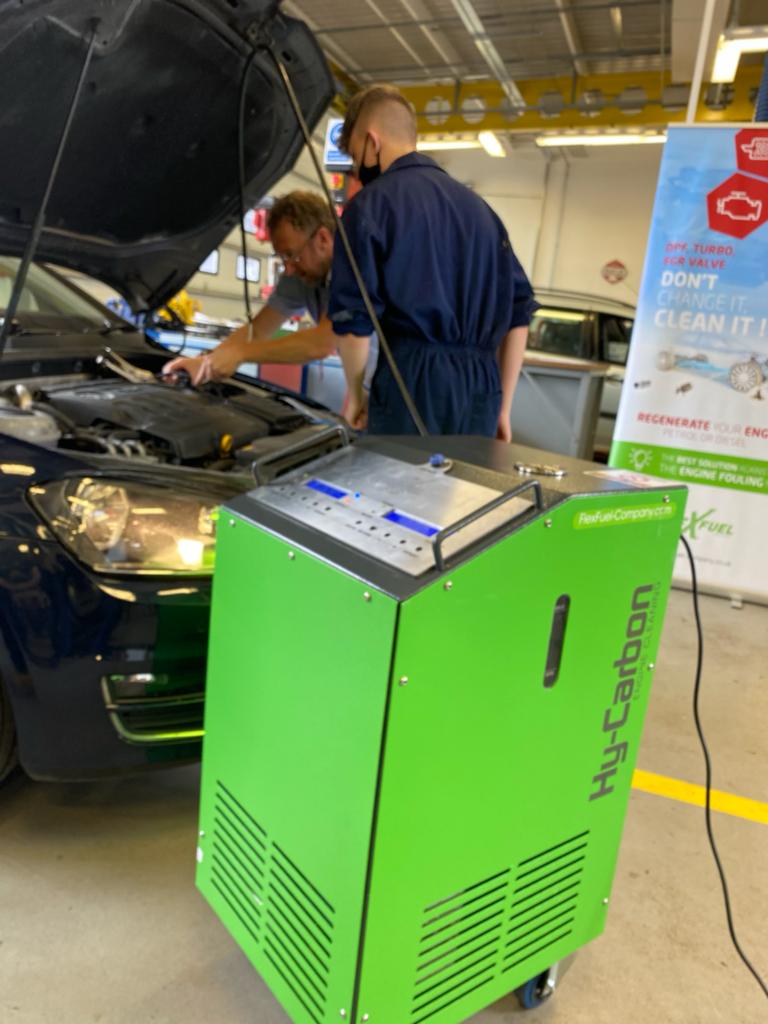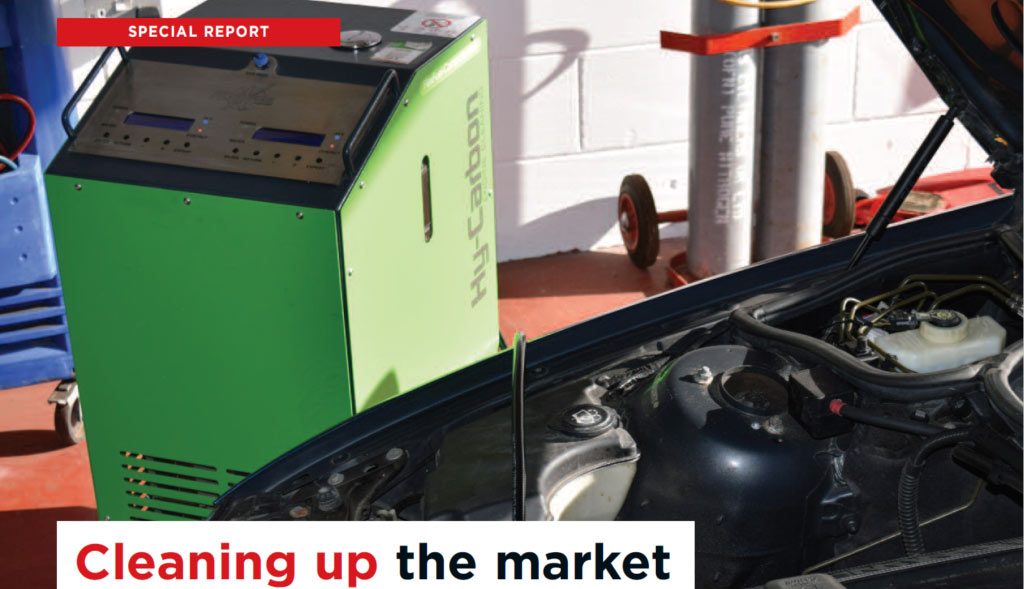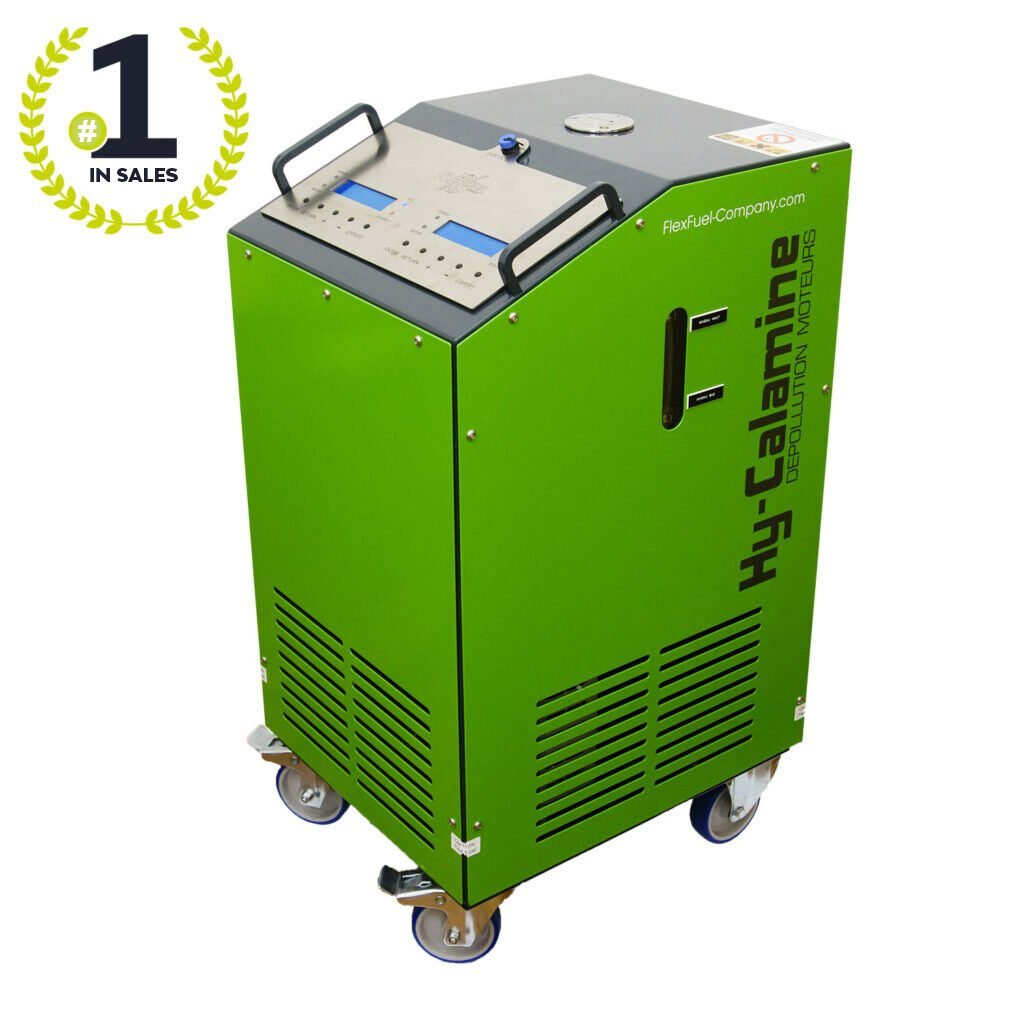Telford College and its Automotive team is now including engine cleaning through hydrogen gas injection using technology from engine cleaning specialists FlexFuel Energy Development UK (FFEDUK) as part of its apprentices training. In doing so, it will guarantee the mechanics of tomorrow are informed on the modern approaches to ensuring engines run more smoothly, efficiently and cleanly.
FFEDUK has provided its Hy-Carbon 1000s cleaning station to the college’s automotive teaching team. The team will be using the station to demonstrate how hydrogen gas acts as a natural solvent on carbon build up in key engine components that can cause premature part failure; power loss to the engine, reduced fuel economy and increased emissions.

Robert Hands, lecturer at the College’s Automotive team comments: “The only constant in the automotive sector is change. Advances and improvements in how engines run are constantly evolving and as such, our approach to maintenance and servicing also needs to change. Our apprentices need to be fully informed on the latest approaches to engine servicing. It is not always about ripping out and replacing faulty parts, it’s about understanding how to prolong the longevity of components and addressing potential issues before they arise. By integrating carbon engine cleaning with hydrogen gas injection as part of an annual service plan, consumers can better protect their engine and garages benefit from a very profitable additional revenue stream.
“Our apprentices, the future technicians, need to understand the latest technologies on the market that can help them make a rewarding career from the automotive sector.
Anthony Harris, national sales manager for FFEDUK comments: “We are very proud that Telford College is now including our technology as part of its apprentice programme. It is further evidence of the effectiveness of our technology at addressing carbon build up in diesel and petrol engines. Increased carbon build up affects turbos, EGR, DPF and emissions and other areas of the engine. In turn, this prevents the engine from running efficiently and is responsible for increased fuel costs, poor engine power and increased emissions. “
FFEDUK has recently introduced its latest innovation in carbon cleaning with hydrogen gas injection, the Hy-Carbon Connect. Hy-Carbon Connect is a fully automated, intelligent and digitally connected carbon cleaning machine. It is the only carbon cleaning machine that includes integrated diagnostics.
The Hy-Carbon Connect builds on the latest developments in Artificial Intelligence. Hy-Carbon Connect learns characteristics of engine makes, fault codes, model, age and number of miles driven from all the Hy-Carbon Connect machines in use around the world. The more data on engine types it collects, the more targeted clean can be applied. Put simply, the machine gets better the more it gets used, better understanding the treatment specific engines require.
Our machines produce industry leading concentration levels of hydrogen gas. The greater the concentration, the more effective the engine clean will be. Through years and years of investment, employing the sharpest minds in the industry and constant evaluation and research and development competitive products do not get anywhere near the volumes of hydrogen production that do. Our carbon cleaning solutions are entirely chemical free, simply using distilled water – and a lot of science – to restore engines to their near factory condition.
- Via a process of electrolysis, we separate the primary molecules that make up distilled water (H20) – into two gases Hydrogen and Oxygen.
- The gas mixture is ‘injected’ into the engine beyond the airflow meter to prevent any unintentional damage.
- The gaseous mixture arrives, via the air intake and the inlet valves, into the cylinders (no cleaning has occurred at this point).
- During the combustion cycles, the piston rises and compresses the mixture. Fuel is injected so that it is atomised at the top dead centre (TDC).
- The compressed mixture of fuel, air, hydrogen and oxygen explodes (by self-ignition for diesel and park plug firing for petrol engines). The temperature can reach 2,500 degrees Celsius with a pressure of up to 60 or 80 bars at the TDC.
- At this stage of the combustion cycle, the hydrogen and oxygen recombine at a higher temperature and greater pressure, thus creating a natural solvent, which starts to dilute the carbon deposits that have built up in the engine over time. It is our deep understanding in how to efficiently produce highly concentrated levels of hydrogen gas that results in a more effective carbon solvent being created. Manufacturers that fail to fully understand this process results in a number of ineffective carbon cleaning products available to the market.
- The re-combination of the hydrogen and oxygen at a higher temperature during and pressure during a cycle enables the Hy-Carbon carbon cleaning station to address and eliminate carbon deposits found in: The cylinders; The piston rings; The pistons; The valve seats and exhaust valve stems; The fuel injector tips (direct injection); Combustion chamber; The glow plug heads
- The gaseous mixture is expelled through the exhaust valve stems before entering the turbo. Some of the gas is diverted into the EGR. The mixture is re-injected via the intake manifold. This allows the station to address and eliminate carbon deposits found in: The turbo; The EGR; The intake manifold; The intake valves
- The diluted mixture arrives at the catalytic converter/DPF: For total cleaning of the DPFs! The DPF retains all this gaseous mixture loaded with impurities and carbon scale. It is necessary to proceed with a natural recovery after all the de-scaling.
- Following carbon cleaning, a revving phase is needed to expel the dislodged scaling. The latter occurs by performing several staged speed increases to guarantee optimal expulsion. We also actively recommend using an active carbon filter fitted to the tailpipe.
Oxfordshire based garage and Point S partner, Second-2-None Vehicle Repairs Ltd, is the latest garage in the UK to partner with engine cleaning specialists, FlexFuel Energy Development UK. The team at Second-2-None has invested in FlexFuel’s carbon cleaning machine, Hy-Carbon 1000s, which uses hydrogen gas as a natural solvent to break down carbon deposits in combustion engines, which are responsible for multiple issues.
Today’s drivers are typically urban drivers, not driving more than 10-12,000 miles and much of the time due to congestion engines fail to reach optimum operating temperatures and speeds. As a result, fuel is inefficiently burnt. This, coupled with latest developments on modern day engines to address emissions and fuel economy, leads to carbon deposits clogging key components. When this happens, fuel economy decreases, emissions can increase and parts such as EGR, turbo or DPF can prematurely fail costing consumers hundreds if not thousands of pounds.
Bob Hopgood, managing director at Second-2-None comments: “FlexFuel’s Hy-Carbon 1000s introduces hydrogen gas into the air intake manifold under pressure and high temperatures. The hydrogen gas acts as a natural solvent on the carbon build up and the deposits are expelled through the exhaust system. By removing the carbon deposits, you can return the engine to the original manufacturers performance; and improve fuel economy, reduce emissions and avoid replacement of costly parts.
We put a lot of value on customer service and high quality work; as such, we need to be sure we are staying abreast in the latest technological advancements. By investing in FlexFuel’s Hy-Carbon we are offering our customers an environmentally friendly solution that brings their vehicle back to life and saves them money.”
Conveniently located in central Faringdon Oxfordshire, Second-2-None Vehicle Repairs Ltd is a family owned company and been operating in excess of 25 years. The company specialises in vehicle Servicing and Mot’s for any make or model including Motorbikes and it is proud to be a Point S partner making it one of the regions leading suppliers of tyres.
With fully trained mechanics and technicians, Second-2-None offers a complete one stop service including laser 4 wheel alignment, supply and free fitment of exhaust systems, battery supplies along with air-conditioning servicing and repairs. They also offer Manufacturer approved Servicing at fixed prices.
This latest partnership reflects the increasing collaboration between FlexFuel and Point S, the independent tyre and autocare network. FlexFuel is already working with numerous other Point S partners.
FlexFuel has over 350 garage partners in the UK and 3,500 globally. It has a range of carbon cleaning products for heavy goods, light commercial vehicles and passenger vehicles. It has recently launched is most powerful machine to date, the Hy-Carbon Connect.
Hy-Carbon Connect is a fully automated, intelligent and digitally connected carbon cleaning machine. It is the only carbon cleaning machine that includes integrated diagnostics.
Through its patented technology, Hy-Carbon Connect analyses the vehicle’s state of health – number of miles driven, fault codes and driver habits.
By using its OBD connection, Hy-Carbon Connect enables automatic control of the engine and its key components allowing engine parts to be automatically ‘set in motion’.
The Hy-Carbon Connect builds on the latest developments in Artificial Intelligence. Hy-Carbon Connect learns characteristics of engine makes, fault codes, model, age and number of miles driven from all the Hy-Carbon Connect machines in use around the world. The more data on engine types it collects, the more targeted clean can be applied.
Record emission failures point to carbon cleaning with hydrogen gas injection as the optimum way forward for consumers and MOT providers
The time for carbon cleaning using hydrogen as injection is now as the UK records record levels of emissions failures. According to data from bookmygarage 1.3 million vehicles are failing MOT tests on emissions with diesels emission failures up by 240% and petrol failures up by 37% on 2017/2018 figures resulting in a total emission failure increase of 70%.
The increase in diesels is, in part, a result of the stricter emission regulations introduced by the government in 2018. The new rules stipulated that any cars equipped with a DPF will ‘fail an MOT if there is evidence it has been tampered with or if smoke of any colour can be seen coming from the exhaust’.
FlexFuel’s carbon cleaning solution, Hy-Carbon, that uses hydrogen gas injection is an independently proven way to effectively reduce harmful emissions resulting from carbon build up in the DPF, valves, EGR, turbo etc. A study undertaken by UTAC CERAM, the global leader providing homologation and testing services, on a Golf VII showed:
| Before Hy-Carbon treatment | Euro 6 FAP | After Hy-Carbon treatment |
| Co2 – 141,04g/km | -0.84% | 139,85g/km |
| CO – 197,8 mg/km | -14.66% | 168,8 mg/km |
| HC – 35,84 ppm | -21,34% | 28,19 ppm |
| NOx – 18,41 ppm | -2,12% | 18,02 ppm |
| PN – 2,32 (E+12) | -86% | 3,3 (E+11) |
Across FlexFuel’s 300 plus partner garages in the UK, and 2,500 globally, garages have seen great results in using Hy-Carbon to address MOT emission failures. Neil Chapman, Offmore Road Garage owner, and one of the first adopters of Hy-Carbon in the UK comments: “We have used HY-Carbon’s curative treatment on BMWs, Audis, Mercedes and all customers are reporting improvements to their vehicles. One vehicle, a 15-year-old Citroen Saxo with 150k miles on the clock had failed its MOT on emissions. Pre-treatment, the Fast-Idle Test returned a CO actual value reading of 11.244 – which would invariably mean a new catalytic converter. We ran the HY-Carbon treatment and were blown away by the emissions reading post treatment, returning an actual value of 0.014 CO.”
Jerome Loubert, business development director for FlexFuel comments: “The latest figures out of the UK are quite startling in terms of the increase in numbers. Consumers and garage owners should be looking to hydrogen gas injection as an effective and reliable way of reducing harmful emissions. Hydrogen acts as a natural solvent on carbon build up in an engine, by breaking that carbon down, the engine can run more efficiently and cleanly. This saves consumers money, offers garages a value add service and means both do their little bit for the environment.”
Since its introduction to the UK, FlexFuel’s hydrogen cleaning solution – Hy-Carbon – has seen rapid growth as the business focuses on marking the green machines the go-to for engine decarbonisation.

Introducing a new business into the UK aftermarket is a tricky operation. However, it helps to have the backing of a major brand in Europe, the right environmental credentials, a unique selling point, and the ability to offer the right service at the right time.
FlexFuel has been able to check all these boxes since first landing in the British market in June 2018. Since then, the company has grown its partner-garage figures exponentially, and plans to double them in the next 12 months. From an unknown quantity, to recognised industry name, just how has FlexFuel achieved so much in a short space of time?

Scotland welcomes hydrogen cleaning company FlexFuel Energy Development® and it seems the aftermarket space is taking note
This month FlexFuel Energy Development UK, FFED UK, the UK’s leading hydrogen engine cleaning company, announced that it has surpassed more than 150 partner garages in its first 12 months of operation.
FFED has been targeting the UK aftermarket space and independent garage owners. Earlier this year, it signed an agreement with Point S – part of the world’s largest Independent Tyre and Autocare Group, which boast over 133 members and 230 Points of Sale in the UK, to provide FFED Uk’s hydrogen engine cleaning solution, Hy-Carbon. And it seems that the benefits of hydrogen cleaning are ringing true to the aftermarket space in Scotland. In the last few months, FFED UK has signed numerous garages in the country including Autotech Edinburgh Limietd, Road Runner MoT and Service Centre in Carluke and Kinloss Garage in Inverness.
All modern petrol engines use direct fuel injectors. They produce more BRAKE HORSE POWER from the same size engines, and go further on the petrol we put in the tank.
The new type of direct fuel injectors spray directly into the combustion chamber, and after the initial explosion.. they spray a bit more fuel to power the piston downwards prolonging the explosion, providing a more efficient combustion. But, there is a price to pay. The modern engine works very well for a short time before clogging up the valve stems in the valve chamber with caron deposits. When this happens, the engine loses power and efficiency as the valve stems are prevented from moving fluidly. […]
There is, of course a plethora of solutions on the market to address these issues and I have tried many, with various levels of success. Recently, my work-shop invested in a hydrogen engine cleaning solution – Hy-Carbon – from a French headquartered company, FlexFuel. A relatively new entrant to the UK, but with 1500 garages in France using Hy-Carbon, I was confident in investing. So, how does Hy-Carbon work?